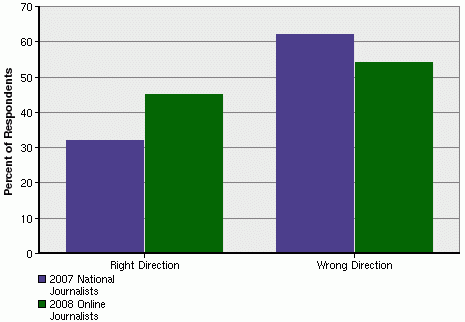A new survey from the Project for Excellence in Journalism and the Online News Association may be a bit of a good news/bad news situation.
The good news is that 82% of online journalists are at least somewhat confident that the industry will find a way to make news on the Web profitable. However, a large majority felt that online advertising would be the path to success and in the weeks since the survey was conducted, the growth in online ads has been slowing considerably.
The survey also indicated where online journalists believe their sites have been successful, as well as opportunities for growth and improvement.
When asked what online journalism is “doing especially well these days,” more named aspects of technology like using advancements well (31%) or speed (30%) than named reporting skills like improving storytelling (16%) or exploiting the potential for greater depth (12%).
And there was real concern about the impact the Web is having on the core values of journalism, though those working in legacy media were more worried about the direction journalism is headed than the online journalists as a whole.

The biggest changes, the respondents said, were a loosening of standards (45%), more outside voices (31%) and an increased emphasis on speed (25%).
More outside voices was seen as both a negative and a positive — negative because it dilluted the power of traditional journalism and positive because it offers the news audience more perspectives on an issue. And speed was considered both a good and a bad thing since spped can sometimes translate into inaccuracy.
And online journalists don’t yet seem to be capitalizing fully on the opportunities the Web provides.
Among the ONA respondents, though, website home pages still dominate. Three-quarters of them said their site’s home page is “essential to getting their content to users.” This is nearly three times the number that named e-mail alerts (26%) and RSS (26%), both of which are also considered passé forms by many inside the technology industry. Just 9% considered posting to social media sites essential. Postings on the increasingly popular YouTube were named essential by a mere 4%. And four times as many (18%) said YouTube postings were not at all important.
All this seems to suggest that those getting into online journalism today have a chance to make a real difference by promoting in-depth and innovative reporting and by pushing their employers to go beyond the Web site walls to reach audience.

